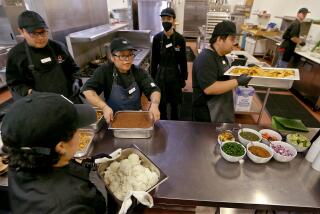Chef School Enrollment Is Cooking : Services: Student numbers are growing 10% a year. Many are abandoning other careers.
MONTPELIER, Vt. — David Thurston got into the construction business after realizing he couldn’t maintain a steady paycheck as a sculptor. But that move also proved unreliable since the recession put the brakes on many building projects.
Now he says the best way to keep food on the table is to work in a kitchen.
At 37, Thurston is training to be a chef. The New York City man headed north for lessons on slicing, dicing and mixing at the New England Culinary Institute in Montpelier.
Many people have been trading business suits for aprons. Enrollment in the nation’s 625 accredited culinary and food management schools has grown 10% a year the past decade, compared to growth of less than 2% at four-year colleges and universities, according to the Career College Assn., a Washington group representing colleges and trade schools.
Much of that increase has come from mid-career professionals, the schools report. Inquiries from this group alone are up 75% over the past two years, according to the American Culinary Federation.
“When we look at the average age of students attending the leading culinary colleges, it’s 26 or 27,” said Edwin Brown, executive vice president of the St. Augustine, Fla., group. “Fifteen years ago, the average age was 19. This is an indication that we have a number of career-changers.”
Cathy Grande, admissions director at the Culinary Institute of America in Hyde Park, N.Y., has seen the trend at her school.
“Today, people seem not to be satisfied just to have a career. They want something that they like to be doing,” she said.
The chefs in training come from a variety of professions. In just the past year, for instance, the Montpelier school has graduated or admitted a New York stock broker, an analyst from the Boston Stock Exchange, a yacht broker from Long Island, N.Y., a newspaper editor from Vermont and a computer programmer from Ohio.
A long passion for food led many into their new careers. But plenty of student chefs also said that dissatisfaction in their previous jobs or the souring economy prompted them to reconsider long-term job prospects.
“I needed something to sustain me through the next 20 years or so,” said Thurston, the former construction worker. “At the time, I was feeling the crunch of the economy.”
Classmate Shawn Parker left his family-run insurance agency in Evansville, Ind., and gave up a construction company partnership with a friend to begin his chef’s training several months ago.
“I sat myself down and had a long talk. I asked myself, ‘Just basically what would you do with your free time?’ It was food,” he said. “I’m a lot happier now. The stress isn’t as overwhelming.”
For some, culinary school offers a chance to expand an existing career. Leslie Viets, for example, sculpted and sold figurines for wedding cakes and began branching into catering in Southern California.
“I spent more time in the kitchen and catering than I spent pursuing markets for my (figurine) products,” said the 25-year-old Malibu woman, who now attends the New England Culinary Institute.
“I felt I could further my career with a professional education and going to a culinary school.”
The U.S. Bureau of Labor Statistics and the National Restaurant Assn. estimate that food service jobs will increase 30% between 1990 and 2005. Chef positions will increase 42%, it said.
“Last year (culinary schools) had five jobs for every graduate,” said Brown, of the American Culinary Institute.
Nonetheless, it’s a big commitment for career-changers.
Many left high-paying jobs for an expensive education--New England Culinary Institute charges $16,175 annually for its two-year program.
Graduates can land line-cook jobs paying between $18,000 and $20,000 to start. More experienced chefs can earn around $35,000, but executive chefs at big-name eateries can pull down incomes approaching $200,000.
“I try to be very straight with people about that,” said Ray Wells, career services director at the Culinary Institute of America. “For any career-changer who has built up their income power, it’s not a lateral move.”
Viets said the money wasn’t her major concern.
“I think the pay is rewarding, but the bonus is that I’m doing what I really love. It’s a double pleasure,” she said. “I feel fortunate that I really feel like at my age I’ve found something I really love to do, and I’m going to enjoy going in to work every day.”
More to Read
Eat your way across L.A.
Get our weekly Tasting Notes newsletter for reviews, news and more.
You may occasionally receive promotional content from the Los Angeles Times.








